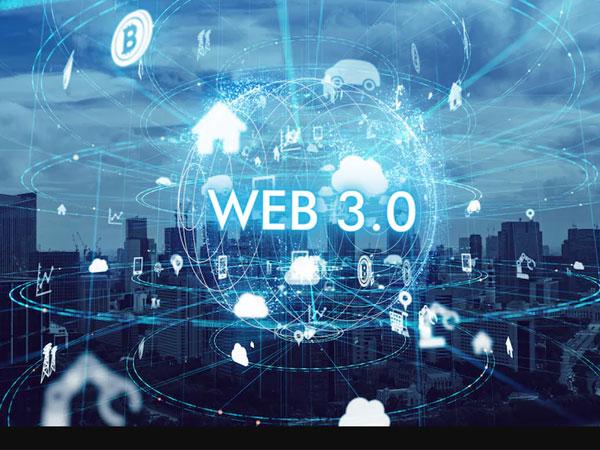Table of contents
- The definition of WEB 3.0 and what is important to know about it
- Web1 is read-only
- Web2 - Read/Write Web
- What are the features of Web2?
- Web3. Decentralization
- Why is Web3 important right now?
- What will remain relevant to businesses in Web3 time?
- Company registration
- Opening bank accounts
- Obtaining licenses
- Intellectual Property Protection
- Legal documents
- Conclusions
The definition of WEB 3.0 and what is important to know about it
Web 3.0 (Web3) is an idea of a version of the Internet that is based on the concepts of openness, decentralization, and changing the course of “internet ownership”. It also uses distributed registry (DLT) and blockchain technologies that ensure decentralization. The separation into periods has been gradual and each has its own distinctive features that make it possible to divide it into periods.
The basic concepts of Web3 were outlined by Jason Calacanis, the head of Netscape. It appeared in the aftermath of the promotion of the idea of dividing eras of the Internet into “versions”. Therefore, it is natural that first there were Web1 and Web2.
Quickly select a jurisdiction and register your company anywhere in the world online
Web1 is read-only
Users only had the ability to view the information that was posted on the sites and to interact with content that had already been uploaded to the servers. In fact, it was an early stage of development, which allowed users to view only what the webmaster had added to the server. For businesses, the Internet in this form was nothing more than advertising in the form of banners and a tool for distributing information. In a sense, it can be compared to an online newspaper. But at the same time, Amazon added the ability to add comments to their products, in a way that started a change in the internet era.
Web2 - Read/Write Web
The concept came about as a result of Tim O’Reilly’s work, who published an article entitled “What Is Web 2.0”. The article specifically outlined the distinctive features of the first and second versions, as well as the subsequent vectors of development of the idea. It is believed that Web2 is ongoing and is just beginning the transition to the new standard.
What are the features of Web2?
Logging has appeared on the Internet virtually everywhere, from taxi ordering sites to crypto exchange sites. Users voluntarily surrender confidential data in favor of businesses in exchange for the convenience of using the services. Large corporations are now able to influence customer behavior through information about them.
As opposed to direct service delivery, in the second iteration, businesses often also make money by selling information about their customers that they have collected over time of use. Targeted advertising is the key point of Web2.
Web3. Decentralization
As mentioned earlier, Jason Calacanis pointed out the main Web3 characteristics, among them:
- Decentralization through blockchain technologies
- AI and machine learning.
- Prohibition of censorship.
- Openness and accessibility
- Decision-making by the community
So, the Internet in this case, has the potential to change in the near future and there is evidence of this, including the development of the meta-universe, cryptocurrencies, NTFs and other resources that may become the basis of the new Internet.
Why is Web3 important right now?
The answer to this question is quite simple – the better a business knows what to work on, understand the system and the processes of development, the easier and more successful it will be. Since we are seeing clear changes in the Internet, especially recently, it is necessary to be prepared for the new conditions for doing business, as well as the problems that surround them.
Speaking about how quickly the Internet can change as cardinally as the Web3 proponents describe, I would not accept their position unequivocally. Everything the ideas say cannot be realized, so it is worth giving maximum attention to what has already arrived in life.
Among the leading categories are the following:
- Cryptocurrencies and electronic money, the development of NFT technologies;
- EMIs and their impact on traditional banks;
- Protection of property, including intellectual property;
- And others.
Thus, it is important to separate what is being promoted by the community into what has potential viability and ideas that will not result in major change in the near future.
What will remain relevant to businesses in Web3 time?
However, the Internet or technology in the world as a whole change, it is always possible to identify categories that will remain fundamental. In this case, for business, its registration, conduct, distribution methods, and legal protection.
Technology brings new experiences for customers to use goods and services, and businesses, in turn, need to take advantage of these for business development. But it’s worth starting with the basics of business:
- Choosing the jurisdiction that will best suit your business and then registering a legal entity;
- Opening accounts to service the needs of the company;
- Obtaining licenses for the company’s business operations, which is especially important during Web3;
- Protecting intellectual property, including trademarks and copyrights;
- Protection of business and customer rights through the creation of Terms & Conditions, Privacy policies etc.
All of these services will remain relevant in the future, whatever developments take place, including the rapid transition to the Web3 version of the Internet. Therefore, we suggest to understand the main points of the above, so that your business will be ready for new challenges and changes.
Company registration
As indicated earlier, there are things that will be binding for business under any changes in conditions. First of all, this depends on the state regulation of business. Therefore, the registration of the company here is a mandatory element. You can also consider entrepreneurship, but unfortunately, in most popular jurisdictions for business, it does not give a significant advantage, so it does not enjoy much popularity.
As an exception, we can mention Poland and Ukraine, which give actually important benefits for private entrepreneurs before registering a company. In the first case, it is the spread of crypto-authorization (cryptolicense) for this form of business. In Ukraine, on the other hand, compared to European countries, a rather soft tax regime is created.
FHC offers legal entity registration services in many profitable and relevant jurisdictions. But, based on the subject matter, we suggest choosing the most appropriate jurisdictions for Web3 business topics.
These include Lithuania, Poland, Cyprus, Estonia (in the European Economic Area) and others. They are distinguished by the fact that they have recently created legislative conditions for themselves, which allow the country to develop as a hub for blockchain-based technologies. All of these countries allow them to subsequently open a license to do business with virtual assets – including cryptocurrencies and NFTs. It is on their basis that Internet version 3 will be developed.
Thus, by choosing the most appropriate jurisdiction for registration, you ensure that your business can more easily adopt technologies and advanced capabilities related to Web3 technologies.
Opening bank accounts
One of the specific features of modern bank accounts is that more and more companies prefer EMI (Electronic Money Institution) to traditional banks. This is especially pronounced for small and medium-sized businesses which are just developing. This can be linked because of several features, which include:
- Faster account opening;
- Remote account opening;
- Better prices for account opening and maintenance;
- Open APIs;
- Ability to work with cryptocurrencies.
At the moment, due to these reasons, EMIs are taking more and more space in the global financial system. For example, Revolut, a famous neo-bank, reported more than 20 million clients in the last period.
Regarding Web3, it is very important that business should become international and not be linked to their host countries. Traditional banks usually cannot offer that. EMIs, on the other hand, due to their mobility and online solutions, already allow to do business from anywhere in the world.
It is also important to note that working with cryptocurrencies in Web3 will play a key role. Cryptocurrencies are based on blockchain technology, which decentralizes the financial world, which in turn changes the way businesses pay for goods and services. The regulation of cryptocurrencies as payment methods is already developing rapidly around the world, even though, with the exception of a few countries in the world, they are not even considered a legal means of payment.
Modern banks are often cautious, or even negative, about businesses based on cryptocurrencies. In this case, it is easier and more profitable to turn to EMIs, which are offer cryptocurrencies. They offer separate cryptocurrency accounts, the ability to exchange fiat currency into cryptocurrencies and vice versa (cryptocurrency exchange services) and much more.
So, talking about the financial part of business, in the Web3 era, it’s important to be able to accept and send payments using cryptocurrencies. Even now, many companies use cryptocurrencies, because it is simply faster and more profitable.
Obtaining licenses
As previously stated, Web3 will be based on Cryptocurrency and NFT technology. As of this writing, cryptocurrencies are going through a crisis – the price of the main cryptocurrency, bitcoin, has fallen to $20,000 per coin. Because of this, NFT prices are also plummeting. For example, OpenSea, the most famous exchange for floating NFTs, lost about 90% of its trading volume in the last six months.
According to DappRadar analysts, the volume of trading on the OpenSea NFT-marketplace in July 2022 was about $500 million, although at the beginning of the year the figure was at $4.5 billion.
This can be linked directly to the temporary, as it is called in the management of the marketplace, crisis, which arose against the background of world events, and, in particular, a sharp fall in the price of cryptocurrencies. Based on the historical development of events, we can assume that the events are indeed temporary.
Market analysts often point out that cryptocurrencies are really applicable in today’s world, which cannot be said about NFTs. At the same time, it is noted that they can become really useful in the near future, with the growing popularity of assets in the meta universe. In this case, it does present a direct practical implication. Already, many jurisdictions have equated cryptocurrencies (and NFTs in particular) with securities. That means that they are now regulated as such by the law. Also, there is regulation as means of payment for goods and services in the world practice (for example, in Japan).
Turning directly to the topic of licensing and permissive activities in the field of Web3, it is worth noting that recently, along with the growing popularity of virtual assets, governments have started to regulate the state. This is based on the factors described below.
Regulation of virtual assets by international organizations. Among them are FATF, BEPS, ESMA and others. The greatest influence in this case has the FATF Recommendations, which introduced such concepts for businesses that use virtual assets, as KYC – know your customer, AML/CFT policies. They allow states to require transparency from businesses.
At the moment, these countries require a license to do business with virtual assets:
- U.S.
- Canada
- UK
- EU countries
- Japan
- Australia
- Singapore
- Hong Kong and many others.
Based on the fact that many regulators in the world in the last few years are not only introducing, but also tightening requirements for businesses built on virtual assets, it is worth getting the necessary licenses. This will allow your business to develop fully transparently, and in addition, a licensed business has higher credibility than the same one, but without licenses.
Intellectual Property Protection
Like the previous stages, the protection of intellectual property, especially copyrights and trademarks, is very important in the aspect that the Web3 will bring with it even more Internet users. World statistics show that every year more than 200 million people start using the Internet. More and more businesses go online and provide services and products online.
So, to protect and secure your rights on the Internet is also extremely important. Most of the trademarks used for goods and services are registered through the Madrid Agreement and Madrid Protocol system, which makes it faster and more profitable to do so. It currently covers most of the jurisdictions a business needs – 125 countries.
A trademark allows a business to be assigned certain text, images, colors or combinations thereof for advertising purposes. If successfully registered, there will be legal protection in the countries that are of interest to you.
About copyrights, they apply (in the Web3 aspect) mainly to texts and designs that are placed on websites. Legal protection in such a case often includes the placement of special protection marks, as well as the placement of warnings in Terms & Conditions, privacy policies and other accompanying documents.
Legal documents
As mentioned earlier, the legal documents that regulate the rights and obligations of businesses and customers, as well as the relationship with regulators, will be even more important with the advent of the Web3. Since, for the most part, everything that is offered by businesses in an online commerce or service delivery environment takes place without the introduction of people to explain customer rights and obligations, it is necessary for web resources to form a cluster of legal documents with which customers can become familiar.
Among the usual set of such documents, the most common is the following scheme:
- Terms & Conditions as the primary document
- Privacy policy – a document that discloses some or all of the ways in which customer or client data is collected, used, disclosed, and managed.
- Cookies note – which data is collected in the form of cookies.
- There is also sometimes a separate document with the licenses used.
Thus, with the help of the documents described above, it is possible to specify the rights and obligations both on the part of the business and on the part of the customers. This will allow you to conduct business without fear.
Conclusions
Based on the specificity of Web3, it is actually not possible to speak in detail about the future, so we have understood exactly those legal aspects related directly to the business – its registration and the next steps of development, which will be relevant both now and during the introduction of Web3 standards more widely.
Therefore, seeing the current picture of the world, it is worth taking into account news and trends that may affect the development of business tools in the future.













